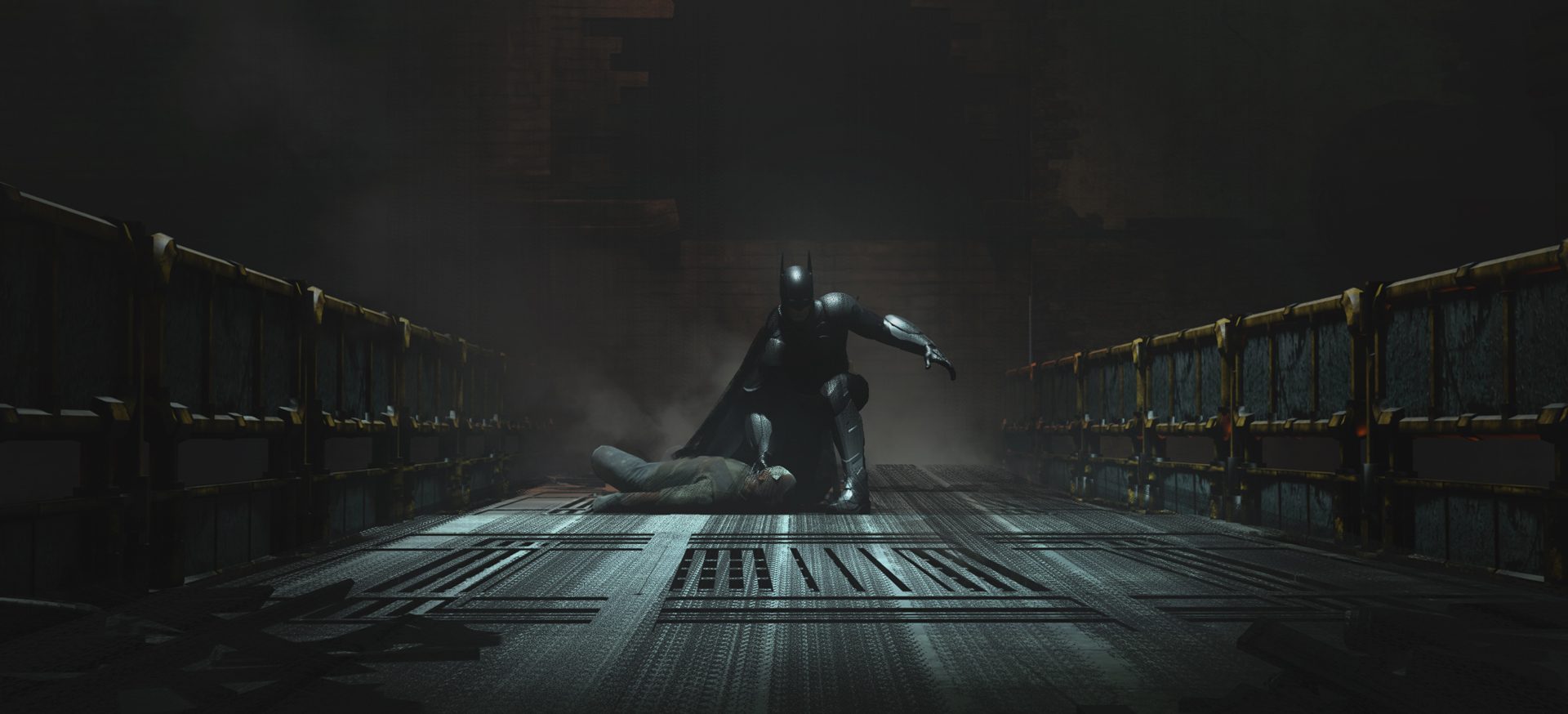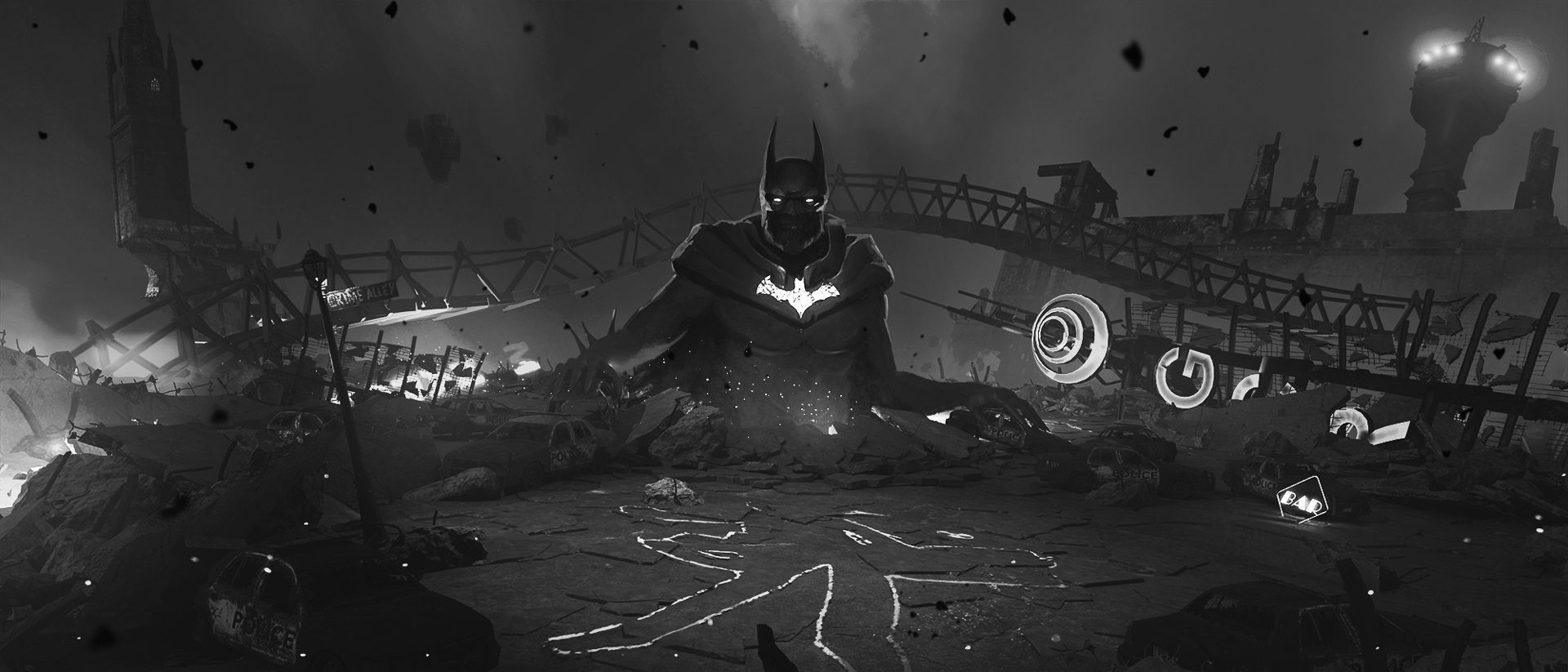Batman: Arkham Shadow had so much to reside as much as. Not solely have been the builders making an attempt to carry one of many world’s finest known-superheroes to VR, they have been additionally constructing a radical new to play a revered recreation collection that hasn’t had a mainline entry since 2015. Following its first superhero success (Iron Man VR in 2020), Batman: Arkham Shadow launched to vital acclaim, cementing developer Camouflaj as one of many trade’s most succesful and versatile VR studios. To study extra about the way it all got here collectively, we sat down to talk with recreation director Ryan Payton, design director Ryan Darcey, and artwork director Matt Kohr.
Editor’s Be aware: The unique art work peppered all through this text is finest seen on a desktop browser with a big display or in panorama orientation in your telephone. Additionally notice that photographs could reveal spoilers of places and characters seen within the recreation. All photos courtesy Meta and Camouflaj.
Larger and Higher (and Batman)
After efficiently launching Iron Man VR for PSVR in 2020 (and later bringing it to Quest), Camouflaj was prepared to determine what was subsequent. Whereas it will have definitely been simpler to construct upon the distinctive design of Iron Man VR for a sequel, the studio as an alternative opted to sort out an entire new problem, and an even bigger one at that.
“Whereas wrapping up growth work on Marvel’s Iron Man VR for PlayStation VR, we have been contacted by Mike Doran and his colleagues at Oculus Studios who inquired about Camouflaj’s future plans,” remembers recreation director Ryan Payton. “Once I instructed him that we have been desirous to do one thing even greater and higher in VR, that completely aligned with their goals, as they have been on the hunt for builders who may make even greater VR video games than what was at the moment available in the market.
Payton and his staff at Camouflaj had labored with Oculus Studios on the studio’s first VR recreation, Republique, and was excited on the alternative to work with them once more. And though the studio had the expertise of Republique and Iron Man VR underneath its belt, Payton was frightened about making an attempt one thing as bold as making Arkham’s signature fight work in VR.
“[…] we explored two or three alternatives with Oculus Studios till I received the telephone name that they needed us to pitch Warner Bros Interactive on a brand new, VR-exclusive official entry into the Batman Arkham franchise. I bear in mind being intrigued by the concept given how a lot I really like Batman, however I used to be frightened we wouldn’t be capable to faithfully translate the basic freeflow Arkham fight into VR,” Payton says.
However Payton trusted the expertise of his staff. Particularly design director Ryan Darcey, who was assured Camouflaj was as much as the problem.
“Ryan Darcey, was way more optimistic about our capacity to execute on all of the core Arkham tenets, particularly on the gameplay facet. He pointed to our capacity to defy expectations with Iron Man VR and requested, ‘why couldn’t we do it once more?’ As a result of his excessive diploma of confidence, I jumped head first into the pitch course of with WB Interactive, focusing primarily on the excessive stage imaginative and prescient and story of the title whereas Ryan Darcey and our unbelievable growth staff created a handful of gameplay prototypes,” says Payton. “By the tip of the pitch course of, we had two improbable gameplay prototypes—one for fight, and one for grapple and cape glide locomotion—that blew everybody away. That was additionally proper across the time our artwork and rendering staff put collectively a gorgeous slice of Gotham that demonstrated how nice the sport would look on Meta Quest. By then we have been firing on all cylinders, and we haven’t let up on the fuel pedal since then.”
Adapting a Identified Amount
 Camouflaj had the problem of not simply making ‘Batman’ work in VR, however an already well-defined model of Batman, full with its personal signature gameplay: the Arkham collection. That meant determining easy methods to carry the feeling of Arkham to the sport, however making it work with the distinctive constraints and alternatives of VR. I requested Darcey which of the mechanics the studio constructed for Arkham Shadow that he preferred probably the most.
Camouflaj had the problem of not simply making ‘Batman’ work in VR, however an already well-defined model of Batman, full with its personal signature gameplay: the Arkham collection. That meant determining easy methods to carry the feeling of Arkham to the sport, however making it work with the distinctive constraints and alternatives of VR. I requested Darcey which of the mechanics the studio constructed for Arkham Shadow that he preferred probably the most.
“I’d have to decide on the Grapnel Gun for its versatility in VR. One of the vital troublesome points working on this medium is determining how the participant goes to comfortably locomote by way of the world. After all, we’ve received ‘easy motion’ management on the analog sticks if you need to discover the atmosphere instantly in entrance of you, however for overlaying nice distances at velocity, grappling is such a beautiful answer that the IP supplies us proper out of the field,” Darcey says. “Along with its locomotive properties, buying the Batclaw opens up a few of my favourite moments in fight. It’s so satisfying to yoink an enemy from throughout the room after which smash him to the bottom. It feels precisely such as you’d need it to really feel in VR: visceral and intuitive.”
Satirically, adapting recognized gameplay tropes (like these already well-established within the Arkham video games) for VR requires utterly rethinking how issues ought to work. Separating the idea from the mechanic—after which constructing model new VR-specific mechanics that keep true to the idea—is the important thing problem. Once I requested Payton the place he feels the sport was most profitable on this enterprise, his reply was clear.
“While you take a look at the vital response to the sport, I feel there’s no query that Batman: Arkham Shadow’s fight suite is the star of the present. The staff did a improbable job reimagining the basic Arkham fight to lean into the strengths of VR, delivering one thing that feels each acquainted and extremely contemporary,” he says.
 Payton additionally remembers realizing internally that the staff was onto one thing. Regardless of a combined response to the preliminary reveal of Batman: Arkham Shadow, he says the studio stored charging forward.
Payton additionally remembers realizing internally that the staff was onto one thing. Regardless of a combined response to the preliminary reveal of Batman: Arkham Shadow, he says the studio stored charging forward.
“Again after we introduced the sport to the world on Could 1, 2024, the web had a visceral response to the sport, to place it evenly. Fortunately the staff at Camouflaj didn’t blink, as we have been assured we have been constructing one thing nice. If something, we have been simply keen to indicate extra of it […],” he says. “All of this jogs my memory of a documentary I not too long ago listened to a couple of band I observe. They knew they’d a killer single from early within the recording technique of their subsequent album, in order that they have been capable of write and document the rest of the album with confidence. I feel Arkham Shadow’s fight was that ‘killer single’ we knew may carry the sport if it wanted to. Fortunately, nevertheless, so many different points of the sport additionally landed extraordinarily effectively, from the sport’s story, stage design, leading edge visuals on Quest 3, and ray tracing-powered audio. It’s a whole album, if you’ll, and one thing we’re extraordinarily pleased with.”
However nailing the essential fight in VR wasn’t the one problem. Darcey remembers the problem of fusing the sport’s normal fight with extra extravagant boss fights—one thing the opposite Arkham video games are well-known for. To make it really feel proper, the studio centered on analysis.
“It was surprisingly troublesome to create boss fights in VR. Like our different function units, we needed to take inspiration from the earlier titles as a lot as doable. We began by watching ClownPuncher’s video rating all of the Arkham boss fights after which deciding on boss inspirations that each match effectively with our villains and represented a wide range of boss struggle kinds. For instance, Joker Enjoyable Home in Arkham Metropolis (Horde Brawler), Deathstroke in Arkham Origins (One vs. One Brawler) and Ra’s Al Ghul in Arkham Metropolis (Large) have been all fights that we referenced for our recreation,” says Darcey. “Boss fights are troublesome, basically, however the factor we discovered most troublesome was translating the texture of Arkham bosses was associated to the transition from third to first individual. We experimented with all kinds of assaults and environmental hazards that have been meant to enhance the core fight, however we stored failing as a result of there’s such lowered situational consciousness in first individual. In the end, we would have liked to determine a option to maintain the motion in entrance of the participant every time doable, and to keep away from assaults coming in from offscreen.”
 Although the staff did a formidable job of creating an Arkham recreation for VR that also appears like an Arkham recreation, not all the things the staff tried labored. Figuring out what to chop and what to maintain is a part of the artwork of creating video games, and Arkham Shadow was no exception. Darcey remembers among the work the staff did that in the end didn’t make it into the completed product.
Although the staff did a formidable job of creating an Arkham recreation for VR that also appears like an Arkham recreation, not all the things the staff tried labored. Figuring out what to chop and what to maintain is a part of the artwork of creating video games, and Arkham Shadow was no exception. Darcey remembers among the work the staff did that in the end didn’t make it into the completed product.
“Because it at all times goes with video games, you’re by no means going to ship all of the concepts you provide you with, no matter how good they’re. The trick is to focus the staff’s power on probably the most impactful options that complement the main themes within the recreation and general marketing campaign construction,” he says. “The primary main class of options that you simply’ll discover on the slicing room flooring is enemy prototypes. We largely pulled from the basic Arkham archetypes—as you’ll see within the last recreation—however we additionally experimented with some new ones, as effectively. One among my favorites was a four-legged TYGER Robotics canine that leveraged odor to sense the participant sneaking up from behind them in predator encounters. The one option to defeat it was by attacking from above or breaking your stealth and going through it head on.”
The robo-dogs in the end didn’t make it into the sport, nor did a couple of of the devices the staff had experimented with.
“One other class of options that we couldn’t totally match within the recreation was devices,” Darsey says. “A favourite there was the Distant Batarang developed by Sean Brennan. Everybody on the staff was skeptical we’d be capable to recreate a snug expertise that precisely translated the function from the earlier Arkham video games, however Sean nailed it proper out of the gate. Upon releasing the Distant Batarang by way of a throw, the digital camera easily hooked up itself to the Batarang after which the participant was in full management flying by way of the air. It was slick.”
